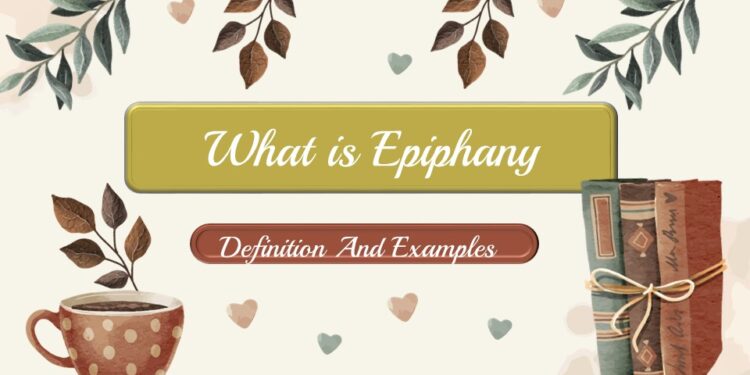What is Epiphany Definition And Examples
Epiphany is a literary term that refers to a moment of sudden realization, insight, or revelation experienced by a character in a work of literature. Derived from the Greek word “epiphaneia,” meaning manifestation or appearance, epiphany involves a significant and often transformative understanding or awareness that leads to a change in perspective, behavior, or understanding of oneself or the world.
Epiphany plays a crucial role in various literary genres, including novels, short stories, plays, and poetry. What is Epiphany Definition And Examples It allows authors to delve into the depths of human consciousness, exploring the complexities of characters’ inner lives and the intricacies of their emotional and intellectual journeys. What is Epiphany Definition And Examples Through the use of epiphany, writers provide readers with profound insights into the human condition and offer moments of enlightenment and clarity.
Also Read-
- What is Diction Definition And Examples
- What is Denotation Definition And Examples
- What is Connotation Definition And Examples
In literature, epiphany can take many forms. It may occur as a sudden realization about one’s identity, purpose, or place in the world. What is Epiphany Definition And Examples Alternatively, it can involve the recognition of a fundamental truth, the understanding of a moral lesson, or the resolution of a conflict. What is Epiphany Definition And Examples Epiphanies can be personal and intimate, impacting an individual character’s growth and development, or they can extend to larger societal or philosophical revelations that transcend the boundaries of the narrative.
James Joyce, one of the most influential modernist writers, extensively employed the concept of epiphany in his works. In his collection of short stories titled “Dubliners,” Joyce masterfully captures moments of epiphany experienced by ordinary individuals living in Dublin at the turn of the 20th century. What is Epiphany Definition And Examples For instance, in the story “Araby,” the young protagonist undergoes a profound realization about the nature of love and disillusionment while attending a bazaar. This epiphany marks a pivotal moment in the character’s coming-of-age journey and represents a loss of innocence.
Another notable example of epiphany in literature can be found in Fyodor Dostoevsky’s novel “Crime and Punishment.” The protagonist, Raskolnikov, experiences a series of epiphanies throughout the narrative, culminating in his ultimate recognition of the moral consequences of his actions. What is Epiphany Definition And Examples Through these moments of revelation, Dostoevsky explores themes of guilt, redemption, and the human capacity for change.
Epiphany is not limited to prose fiction but also appears in poetry. What is Epiphany Definition And Examples In T.S. Eliot’s renowned poem “The Love Song of J. Alfred Prufrock,” the titular character has a series of epiphanic moments that reveal his fears, insecurities, and anxieties. What is Epiphany Definition And Examples These realizations contribute to the overall theme of existential crisis and self-doubt present in the poem.
The use of epiphany in literature serves multiple purposes. What is Epiphany Definition And Examples It allows authors to deepen their characters, providing them with internal struggles, growth, and self-awareness. What is Epiphany Definition And Examples Epiphanies can also serve as turning points within a narrative, propelling the plot forward or causing a shift in the story’s direction. What is Epiphany Definition And Examples Moreover, epiphanies enable readers to empathize with characters, as they too can experience a sense of recognition or enlightenment through the characters’ revelations.
To effectively convey an epiphany, writers employ various literary techniques. What is Epiphany Definition And Examples These may include the use of vivid and evocative imagery, powerful symbolism, metaphorical language, stream-of-consciousness narrative, and juxtaposition of contrasting elements. What is Epiphany Definition And Examples By employing these techniques, writers create an immersive and impactful reading experience that allows readers to share in the characters’ moments of revelation.
Examples Of Epiphany
- “To the Lighthouse” by Virginia Woolf: In this novel, the character of Lily Briscoe experiences an epiphany while painting a picture. She suddenly understands the true essence of life and art, realizing that the purpose lies not in capturing the perfect image but in the process of creation itself.
- “The Catcher in the Rye” by J.D. Salinger: The protagonist, Holden Caulfield, has a series of epiphanies throughout the novel, but one of the most significant occurs when he watches his sister Phoebe riding a carousel. What is Epiphany Definition And Examples He realizes that he cannot protect her from the difficulties of growing up and acknowledges the importance of embracing the complexities and challenges of life.
- “Macbeth” by William Shakespeare: Lady Macbeth experiences an epiphany after the murder of King Duncan. What is Epiphany Definition And Examples Initially driven by ambition and a desire for power, she eventually realizes the psychological and emotional toll of her actions, leading to her descent into madness.
- “The Great Gatsby” by F. Scott Fitzgerald: The character of Jay Gatsby has a profound epiphany when he finally understands that his obsession with wealth and status cannot bring him happiness or win back his lost love, Daisy. What is Epiphany Definition And Examples This realization marks a turning point in his character arc and contributes to the tragic nature of the story.
- “The Awakening” by Kate Chopin: The protagonist, Edna Pontellier, experiences an epiphany during a swim in the ocean. As she floats in the water, she realizes the limitations and expectations placed upon women in society and the oppressive nature of her own existence. What is Epiphany Definition And Examples This moment leads to her pursuit of personal freedom and self-discovery.
Conclusion
Epiphany, as a literary term, plays a significant role in literature by providing moments of sudden realization, insight, or revelation for characters. What is Epiphany Definition And Examples It allows authors to delve into the depths of human consciousness and explore the complexities of characters’ inner lives. What is Epiphany Definition And Examples Through the use of epiphany, writers offer readers profound insights into the human condition, personal growth, and transformation. What is Epiphany Definition And Examples Epiphanies can be pivotal moments in a narrative, leading to changes in perspective, behavior, or understanding. What is Epiphany Definition And Examples They contribute to character development, plot progression, and the exploration of themes and messages within a work of literature. What is Epiphany Definition And Examples Employing various literary techniques, writers create immersive experiences that enable readers to share in the characters’ moments of revelation.
FAQ.
Q. Can epiphany only occur in literature?
Ans. Epiphany is commonly associated with literature but can also occur in other forms of art and in real-life experiences. In literature, however, epiphany is a technique specifically used by authors to provide moments of revelation for their characters and readers.
Q. Is epiphany limited to a specific genre?
Ans. Epiphany can be found in various literary genres, including novels, short stories, plays, and poetry. It is not limited to a particular genre but can be utilized in any form of literature to deepen characterization and explore themes.
Q. Are epiphanies always positive or enlightening?
Ans. Epiphanies can have different effects on characters and may not always be positive or enlightening. They can bring about feelings of confusion, despair, or regret, depending on the circumstances and the character’s perception of the revelation.
Q. Are epiphanies limited to main characters?
Ans. While epiphanies often occur within the journeys of main characters, they can also involve secondary characters or even groups of people. Epiphanies can be individual or collective, impacting the development and dynamics of multiple characters.
Q. Can epiphany occur multiple times within a single work?
Ans. Yes, epiphany can occur multiple times within a single work. Characters may experience various moments of realization, each contributing to their growth or understanding of the narrative’s themes. These multiple epiphanies can build upon each other or provide contrasting perspectives.















